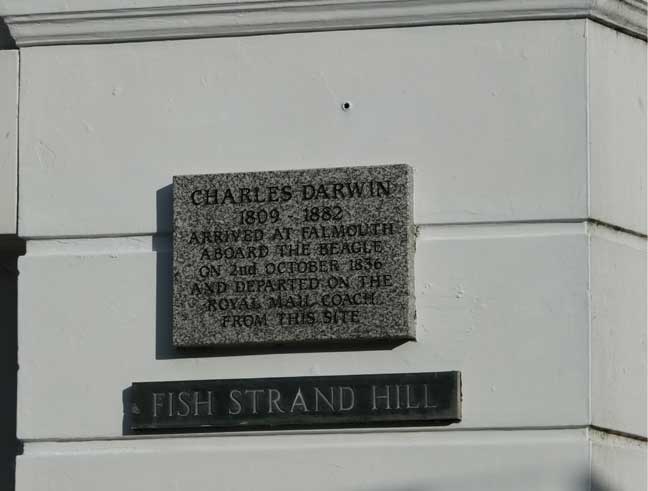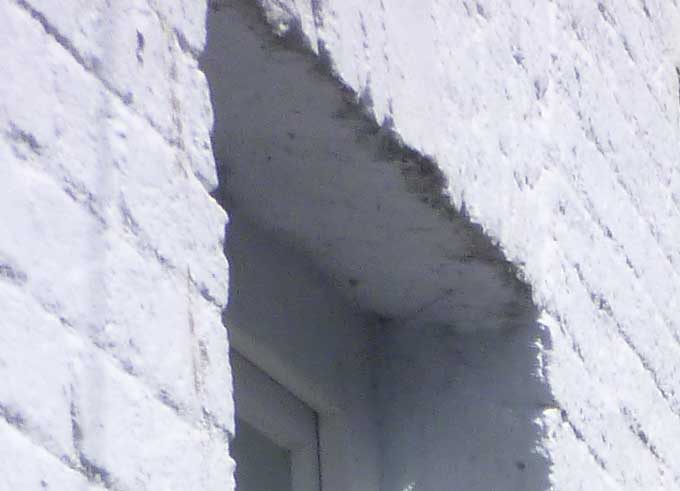Nothing you could actually point to, and say “That is the sky.” Matching sea: grey, barely awake. The trees nearest to the house are still green, and they’re moving just slightly, so I suspect this is going to turn out to be a pleasant, fresh morning for my walk – my occasional morning walk; that makes it sound more regular than it is – and just a little bit more blowy and breezy than it looks from this just-got-up room. I shall have to take a notebook with me.
[Later the same day. Same room, but the light in the kitchen next door has been switched on. Noises off to represent: extractor fan, saucepan on gas cooker, eggs boiling. As the curtain rises, William bends over his laptop.]
Overcast and probably high pressure – close, anyway. But there was a bit of movement in the air, so no need for the word “muggy”. Short version: I enjoyed my walk. There was a Scottish couple (accents) who agree with each other, as I passed them, that this weather was preferable to “that cold”. There was a young man with a dog that touched its nose to my hand as they passed me (I can’t quite bring myself to word this so that I have to clarify: dog’s nose, not boy’s), and then there was a man, my age, tanned, dressed for fitness, who went past with his smartphone held up to his face. Looking into it.
I thought about that for a bit, then I sat down on the high kerb at this end of Wellington Terrace, pulled out my notebook, and wrote the post below the picture. Most of it, anyway. Some of it. Okay, the opening sentence. I didn’t balance a laptop on my knee and write with an inane grin on my face, but in every other respect, that was a state-of-the-art, cutting-edge moment. I was “on the go”. I was “in control”. Just a pity I was writing in a small black notebook with a dragonfly printed on the front. Pity I was using a cheap felt-tip I bought from Sainsbury’s in Truro.
I had to wait for the notebook to open up, of course, and then I had to wait while it installed an upgrade and asked me to confirm my identity, so it was probably a good thing I didn’t start with an inane grin on my face – keeping it up would have given me cramp. I had to open a new page, but at least that didn’t take long. [Additional marks will be awarded to candidates whose papers include discussion of why the writer is talking such nonsense.] Getting the felt-tip to work was easy by comparison: I took the lid off and it was already fully charged.
A fine walk. But we’re no nearer writing this week’s blog post. I came back to the house and sat down and, yeah, here we are. [Why does the writer omit any reference to putting eggs on to boil? 10 marks.] I did have an idea for a piece under the title “What happens to pond weed?” but that both overdoes it in the arresting-opening-sentence department [Huh? 5 marks.] and doesn’t get me to the answer I wanted to reach, so we’ll brush that one back under the carpet. My idea was that over-populations correct themselves.
Ponds with a lot of weed in them tend to attract weed-eating insects and animals. Summer weather conducive to wasps typically ends with a hard frost – or at least, we notice the first hard frost, and imagine the wasp:frost symmetry. I was going to go from there to saying something about dominant species that damage the climate by their over-use of fossil fuels, but I couldn’t quite make the logic work. It’s just that I’ve been part of several conversations recently – enough to be, ah, “statistically significant”, at least to me - in which the problems of the world have been blamed on over-population.
Global warming, lack of car-parking spaces, crowded beaches, green ponds and waterways, NHS in crisis, slow internet and populism – all down to the over-supply of people. There are too many of us, and what I was going to say is … oh, I can’t be bothered. Falling birth rates, aggressive climate, yes, you’ve been in those conversations too, haven’t you? Thanos, in that film, deletes half the population to save the other half, right? So it’s down there in the collective subconscious. Yeah, yeah, we’re wrecking our own habitat. But isn’t that just … what we’re instinctively going to do?

I remember those aspirational ads in which young urban sophisticates dashed between meetings, holding bricks to their ears and looking serious about whatever they were hearing (younger readers: pre-smart mobile phones used to be the size of bricks). The glossy-magazine ads in which a clutch of male and female supermodels in designer clothes gathered around a laptop to be beautifully impressed by whatever they saw on their shared screen.
Oh, and do you remember the one in which a vaguely arty-looking fit and healthy barefoot young person sat in a tree with his laptop to work on his screenplay? And that other one – the vaguely arty-looking fit and healthy barefoot young person sits cross-legged on a log in the middle of a stream with her laptop to work on her screenplay between bouts of meditation?
You don’t? Oh. Maybe my interior life is stranger than I realised.
You must remember the (epistolary?) novels written entirely in exchanges of text messages? And all those (printed) guides to “text-speak”? No? Really? Well, I have one of those to show you! It’s just … here. How strange…
Somebody must have moved it. I’m sure I had it right – never mind.
My point being, of course, that we’ve got everything we dreamed of having, oh, ten, twenty years ago. Back when technology didn’t really work very well, and the bandwidth wasn’t there, and the processing power was barely 100 times what it took to get us to the moon – back then, we could really see what was coming. The paperless office, remember? The intelligent fridge? A lot of talking animatedly into our phones about serious things?
I used to think that the spy novels of Len Deighton were written to make office life seem interesting – sorry, that line floated in from a parallel blog post. There’s a parallel universe in which I write about the spy novels of Len Deighton. It’s probably also full of lost guides to text-speak.
It’s just interesting, that’s all I’m saying. Those of us who are digital immigrants (remember that distinction?) can not only see how the world has changed, but also how far it has deviated from all the predictions. Every generation learns this eventually, I think: the obvious, or at least predictable, outcome isn’t the one that comes. There are too many variables.
Now that we have the technology, we’re having fun with it. More importantly, now that we’ve got it, we can forget about it and move on to the next stirring vision for the future. Which is ... ?



